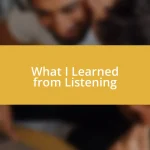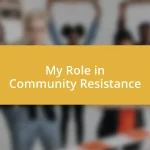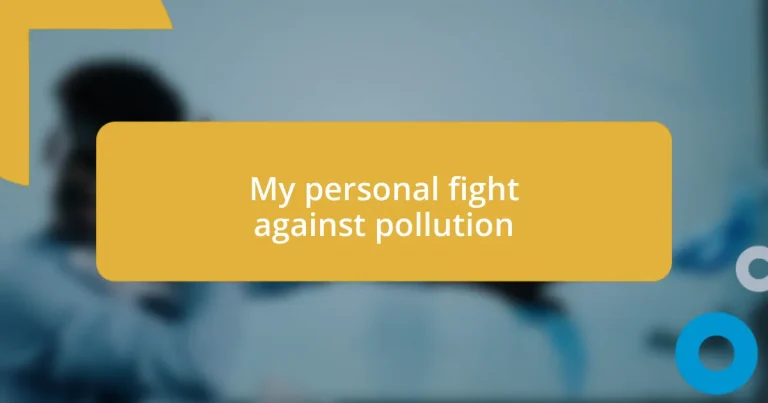Key takeaways:
- Pollution impacts health and environment, often stemming from everyday activities and choices.
- Recognizing sources of pollution, such as vehicle emissions and plastic waste, can inspire personal habit changes.
- Community actions, like clean-up events and supporting local advocacy, amplify individual efforts against pollution.
- Innovative technologies and sustainable practices, such as air purifiers and minimalism, contribute to a cleaner, greener lifestyle.
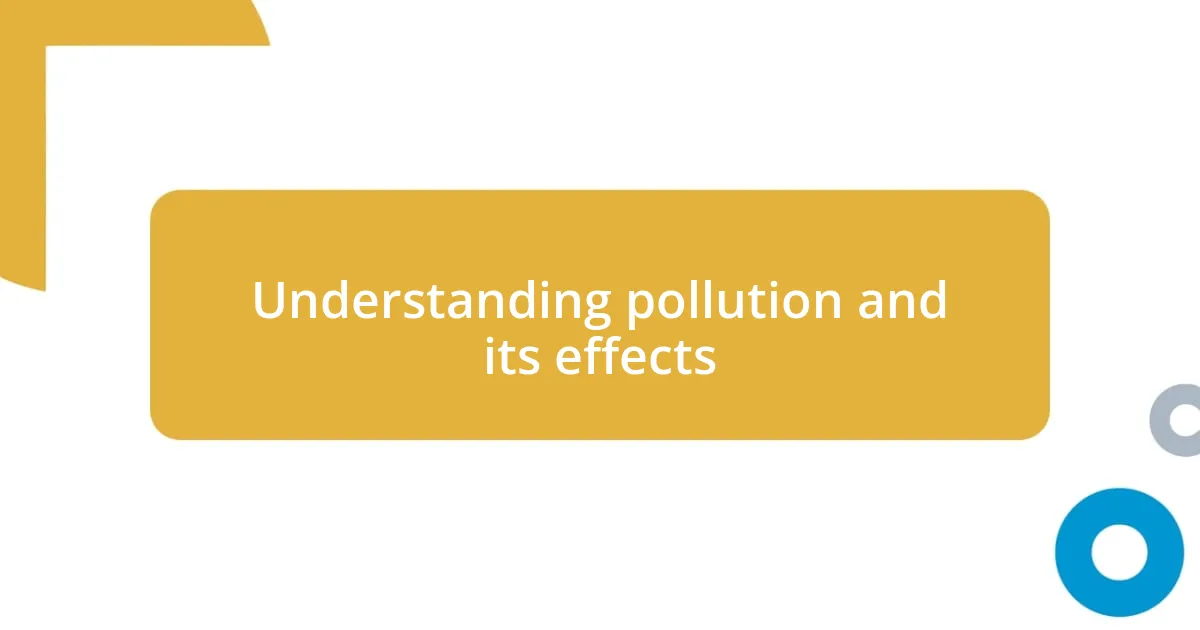
Understanding pollution and its effects
Pollution is a multifaceted issue that seeps into our air, water, and soil, impacting not just the environment but our health as well. I remember a hike I took through a once-pristine forest; I was struck by how the sound of birds was muted by the ominous hum of nearby traffic. Isn’t it troubling to think that the beauty of nature can be overshadowed by human activities?
As pollutants accumulate, they create a ripple effect that can lead to serious health problems, from respiratory diseases to neurological disorders. I’ve witnessed friends struggle with asthma, their lungs attacked by the very air we breathe, and I can’t help but wonder: when did we allow our health to become a trade-off for convenience? It’s a stark reminder that pollution doesn’t just exist in distant lands; it’s right here, threading through our everyday lives.
The physical environment we inhabit screams for attention. I recall visiting a local river where I used to fish as a child. The water that once sparkled with life is now tainted, choked by waste. Reflecting on these changes, I often ask myself—what kind of legacy are we leaving for the next generation? Each piece of trash thrown away without thought is a small thread woven into a much larger, harmful tapestry.
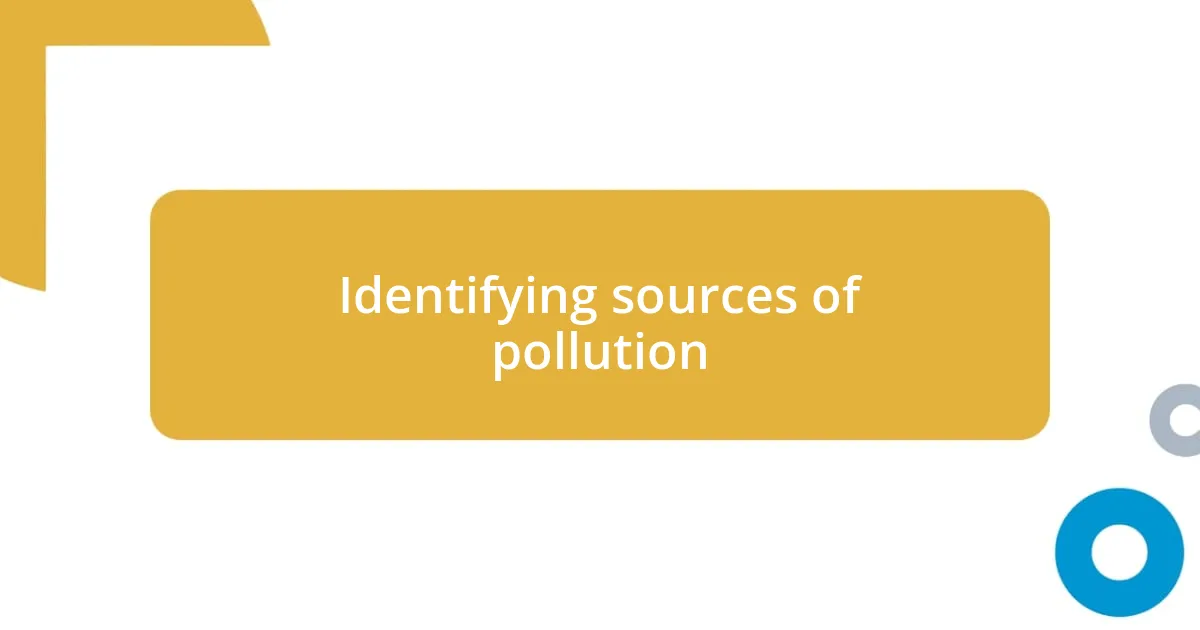
Identifying sources of pollution
Identifying the sources of pollution starts with a thorough awareness of our surroundings. Often, we overlook everyday activities that contribute to environmental degradation. I recall a weekend barbecue at a friend’s house where plastic plates and utensils filled the trash, seemingly insignificant at the time. Yet, moments like these collectively compound the plastic waste choking our oceans and ecosystems.
Here are some common sources of pollution:
- Vehicle emissions: The smoke from cars and trucks releases harmful gases into the air.
- Industrial discharges: Factories often release waste materials into nearby water bodies or the atmosphere.
- Agricultural runoff: Fertilizers and pesticides can seep into soils and water, posing threats to local wildlife.
- Waste disposal: Improperly managed landfills generate leachate that contaminates groundwater.
- Excessive packaging: Single-use plastics and cardboard create heaps of landfill waste.
By recognizing these sources, I feel an urgency to change not only my habits but also to inspire others to consider their impact. Sometimes, it’s the little changes—like bringing reusable bags or choosing glass over plastic—that can spark a transformative shift towards reducing pollution.
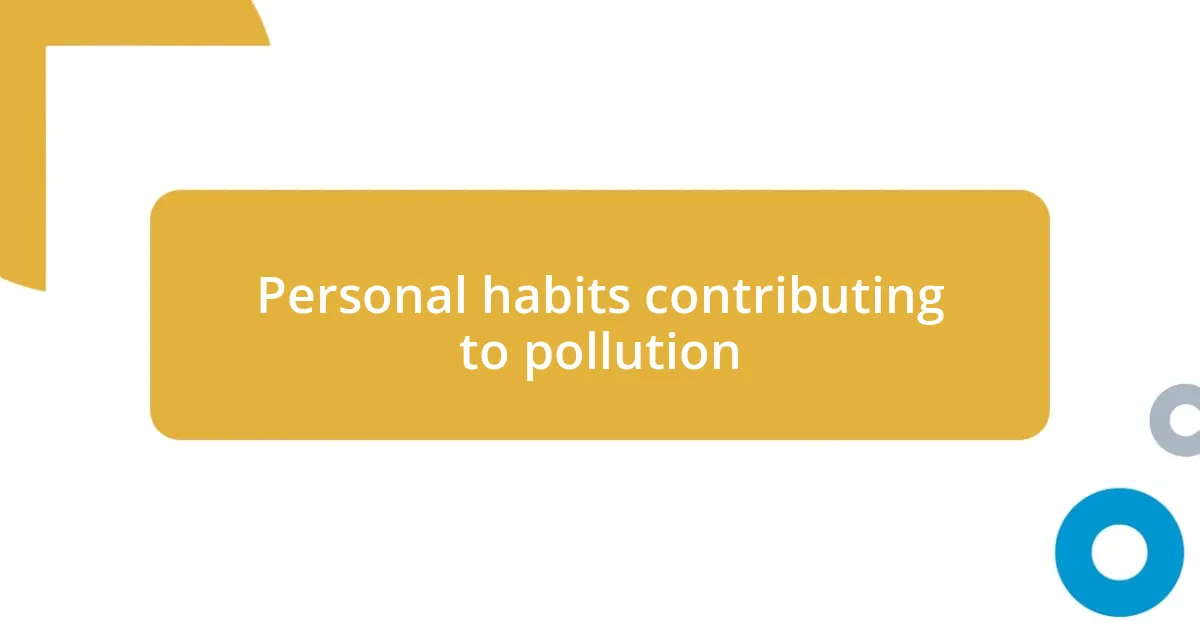
Personal habits contributing to pollution
There are countless personal habits we tend to overlook that contribute to pollution. For instance, I recall a time when I thought just driving to the store was a minor choice until I learned how each trip adds to greenhouse gas emissions. Then, I decided to walk or bike more often. It was refreshing, not just for the environment but for my own well-being. How often do we choose convenience over a more sustainable option without even realizing it?
Another surprising contributor is our consumption habits. I used to be guilty of buying bottled water without considering the plastic waste it generates. When I switched to a reusable bottle, it felt rewarding to know that I was making a small but impactful change. Sometimes, we get so caught up in our routines we forget that embracing simple habits can lead to remarkable benefits for our planet.
Lastly, I’ve noticed that my food choices can inadvertently add to pollution. For a while, I was unaware of the environmental toll of processed foods and the packaging they come in. This realization pushed me toward local farms and bulk stores with minimal packaging. It was a journey that taught me how personal habits can ripple out into larger environmental impacts. Have you ever thought about how your dietary choices play a role in this?
| Personal Habit | Pollution Contribution |
|---|---|
| Driving short distances | Increases vehicle emissions |
| Using single-use plastics | Contributes to landfill waste |
| Consuming processed foods | Involves packaging waste and transportation emissions |
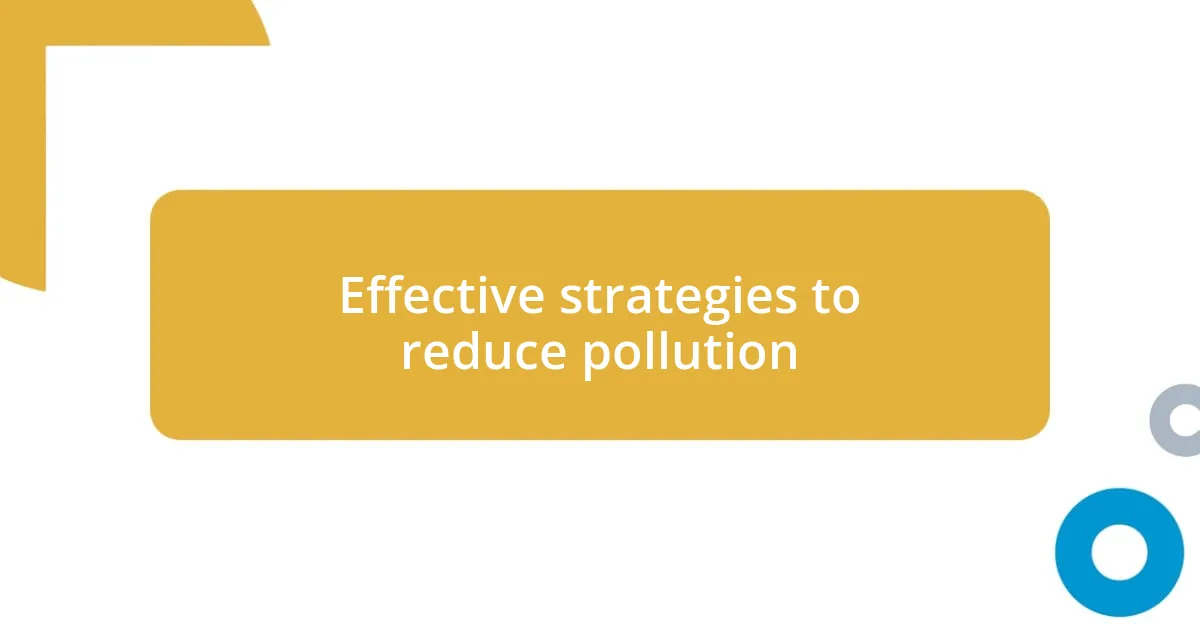
Effective strategies to reduce pollution
Effective strategies to reduce pollution can often seem daunting, but I’ve found that small, deliberate actions can lead to meaningful change. When I decided to start composting kitchen scraps, it felt like a simple task at first. Yet, it transformed not only how I viewed waste but also reduced the volume headed to landfills. Have you ever realized how your food choices can directly impact waste levels?
Another approach that’s made a significant difference for me is advocating for and using public transport. There was a time when I debated the convenience of driving alone versus taking the bus. After consistently opting for the bus, I noticed not only a decrease in my carbon footprint but also discovered a sense of community among fellow commuters. Isn’t it fascinating how transportation habits can forge connections?
Lastly, I urge everyone to be mindful consumers through prioritizing products with minimal packaging. At my local market, I noticed a section dedicated to bulk goods. Transitioning to buying items like grains and spices without an excess of packaging left me feeling empowered. It’s a straightforward strategy, but have you considered how much waste can be avoided with such small shifts in shopping behavior?
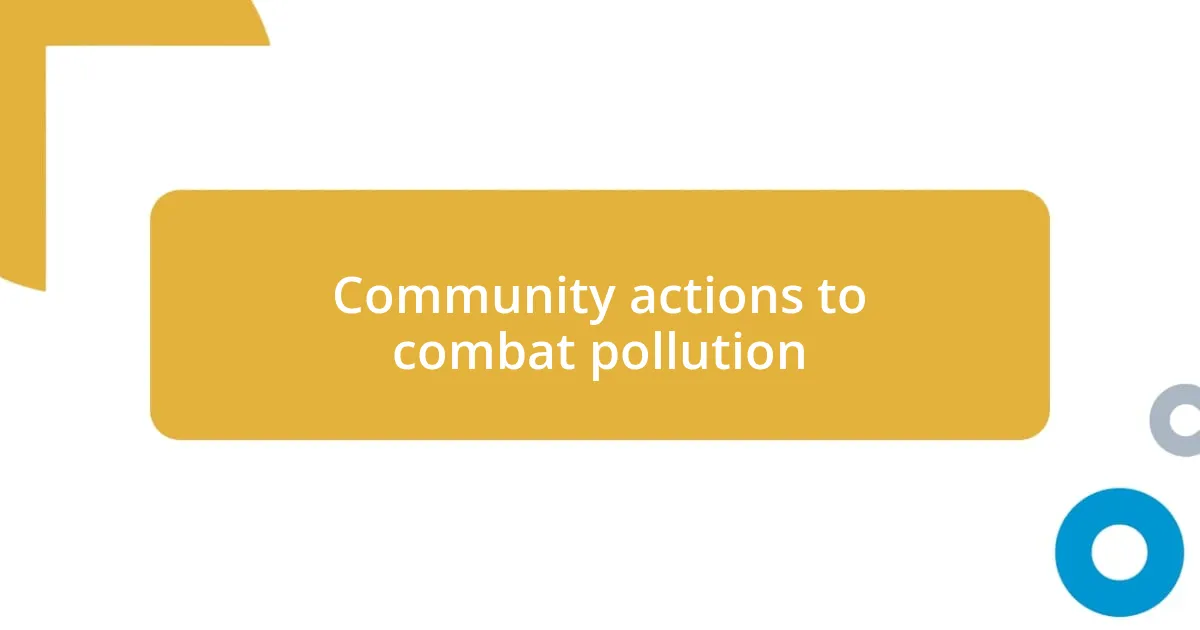
Community actions to combat pollution
One of the most rewarding community actions I’ve become involved in is organizing neighborhood clean-up events. The first time I participated, I was amazed at how many people showed up, eager to make a difference. We collectively picked up trash from parks and streets, and it was inspiring to see our little corner of the world transform right before my eyes. Have you ever seen the impact of collective effort in your own community?
Additionally, I’ve found that supporting local environmental advocacy groups can amplify our efforts against pollution. When I joined a local ecology group, I felt a sense of belonging and purpose. We collaborated on campaigns to encourage local businesses to adopt eco-friendly practices. It made me realize how powerful our voices can be when united. Have you ever considered how grassroots movements can reshape community values?
Another initiative I’ve seen gaining traction is the establishment of community gardens. When our neighborhood launched one, I initially thought it was just about growing vegetables. However, it turned into a hub for education on sustainable practices and a space for neighbors to connect. The shared effort to nurture the garden brought a sense of pride and camaraderie that I didn’t expect. Isn’t it incredible how a simple garden can foster community spirit while combating pollution?
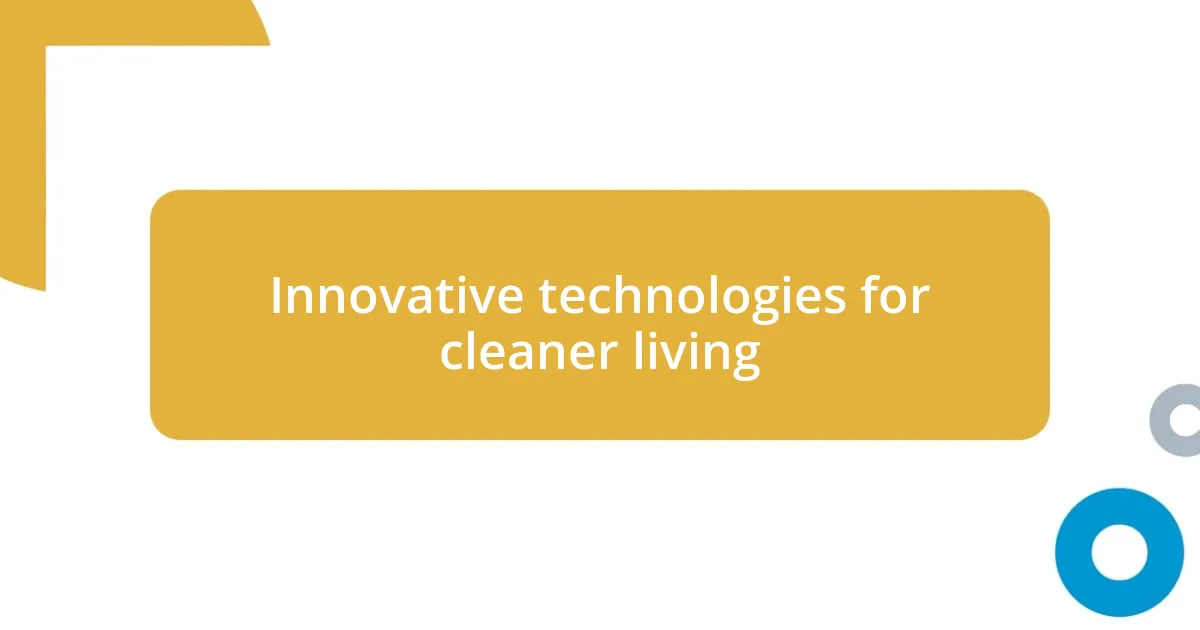
Innovative technologies for cleaner living
When I first heard about air purification technology, I was skeptical. I remember buying a small air purifier for my bedroom, hoping to breathe easier, and I was pleasantly surprised. The difference in air quality was tangible; I felt more energized and focused. Have you ever experienced a moment where the air felt fresher just by making a small change in your environment?
Smart home devices have also become game-changers for me. Equipping my house with sensors to monitor energy usage not only cut down on waste but also made me more conscious of my habits. For instance, I was shocked to see how much energy my old appliances consumed when left on standby. Isn’t it eye-opening how technology can shine a light on our blind spots?
Another innovation that has captured my passion is the rise of sustainable building materials. I recently visited a friend’s new eco-friendly home, and the use of recycled materials was striking. Seeing how beautifully those elements blended together sparked a deeper appreciation for sustainable design. Have you considered how the choices we make in construction can lead towards a cleaner, greener future?
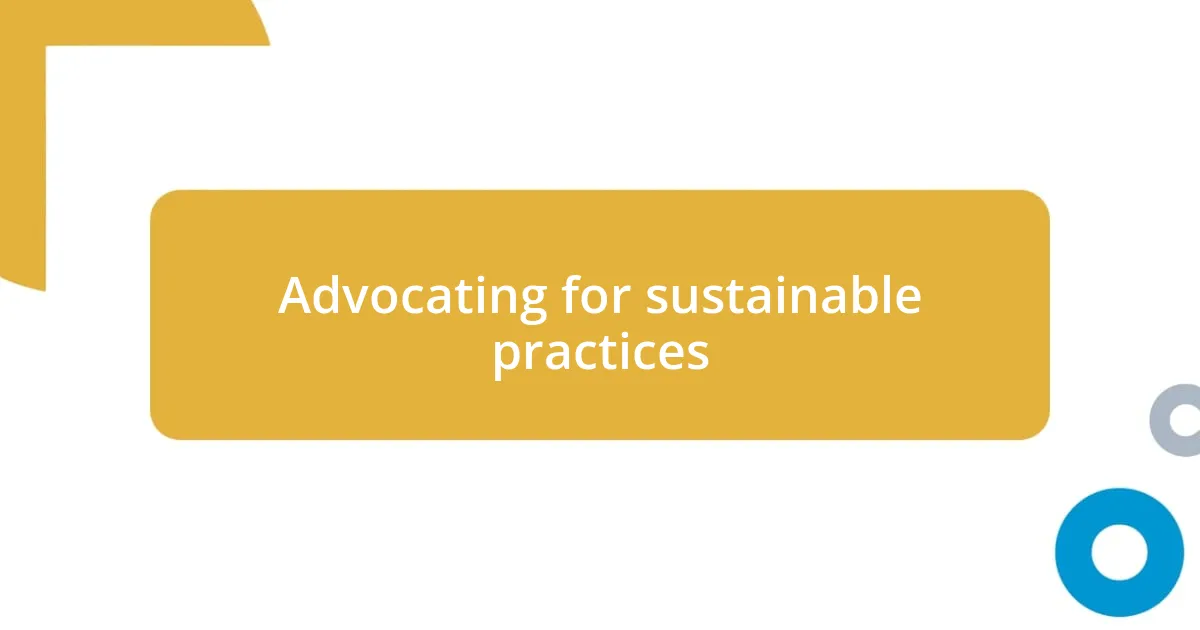
Advocating for sustainable practices
Promoting sustainable practices is something I truly believe in, and it starts with simple choices we make every day. For me, switching to reusable bags when I go shopping was a small but powerful step. I still remember the first time I saw the cashier looking puzzled over my bags; it felt good to explain why I made that choice. Have you ever felt empowered by a small change that reflects your values?
In my journey, I’ve also explored the concept of minimalism, which has surprisingly linked back to sustainability. I recall decluttering my home and realizing how much waste I had accumulated over the years. By choosing to buy less and prioritize quality and durability, I not only reduced my impact on the environment but also cultivated a deeper appreciation for the things I did own. Isn’t it remarkable how embracing less can lead to more meaningful living?
Furthermore, I’ve been actively involved in advocating for policy changes at a local level. Attending town hall meetings, sharing my thoughts with decision-makers, and supporting sustainable legislation has opened my eyes to the power of our voices in shaping the future. It’s exhilarating to think about the ripple effect of our collective action. Have you considered how your voice can influence local policies for a greener community?

